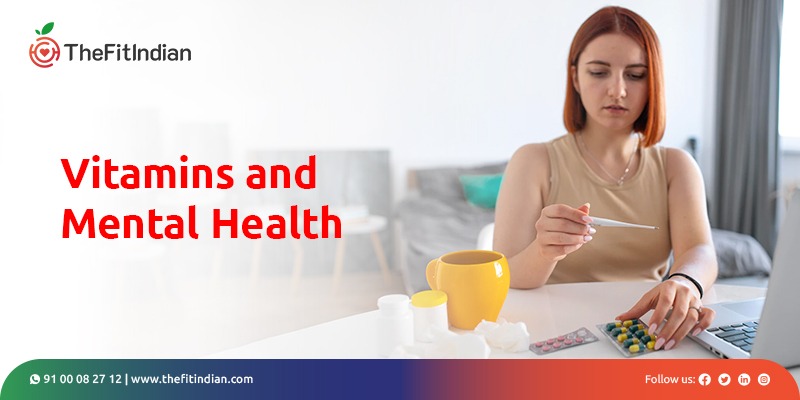The Striking Link Between Vitamin Deficiency and Mental Health
Reviewed by: Dr. T S Deepthi Sarojini | Author: Manoja Kalakanti

Anxiety, depression, irritability, and insomnia are the white elephants of modern life. However, there was a time when such rare ailments were considered demonic, like someone lacking spiritual fruit. And patients experiencing dementia or memory loss were straightaway branded as the walking dead. Little did they know the symptoms were obvious signals of vitamin deficiency. Ignorance and unawareness could be a plausible answer. Sadly, even today, some ailments go unnoticed or untreated despite increasing awareness and medical advancements. Typically, mental illness is often associated with numerous reasons other than the most basic ones. People tend to forget that the lack of essential nutrients and vitamins in their bodies could culminate in some severe health issues; anxiety, depression, or insomnia could be one of them. Untimely detection, unwillingness to talk about them, or resorting to home remedies could only magnify the damage beyond repair.
Understanding Vitamins and Mental Health Correlation
Vitamins and minerals are essential nutrients functioning like oils lubricating the parts of the human body machine, enabling a frictionless operation. For example, the B-complex vitamins are pivotal in mental and emotional well-being. However, there’s no scientific evidence to prove that such mental issues wouldn’t occur despite observing a regular balanced diet. But hindsight is that the deficiency of vitamins and other nutrients could impair your immune system and slow the average growth and development of the body and mind.
Vitamin deficiency signs and symptoms are apparent and easily detectable. But, as stated earlier, they usually go unnoticed until your body’s clock resounds doomsday!

Vitamin Deficiency Anemia
Anemia, as we know, is the lack of healthy red blood cells in your body caused by the deficiency of vitamin B-12 and folate. The absence of such nutrients results in the production of large red blood cells that don’t function per expectations or carry oxygen like they were supposed to. The symptoms are usually subtle at first, increasing the possibility of going unnoticed. But, prolonged vitamin deficiency anemia can eventually magnify the symptoms to the extent of shutting down the whole body.
Here are a few common signs to consider:
1. Fatigue
2. Shortness of breath
3. Dizziness
4. Pale or yellowish skin
5. Irregular heartbeats
6. Weight loss
7. Numbness or tingling in the hands and feet
8. Muscle weakness
9. Personality changes
10. Unsteady movements
11. Mental confusion or forgetfulness
Vitamin B Deficiency and Mental Instability
An absence of the entire family of vitamin B, B1, B6, B7, B12, B complex can result in a zillion health symptom. Vitamin B is known to strengthen the human brain. A disruption in the nervous and circulatory systems is associated with a lack of essential vitamin B. Since B12/B9 is indispensable for mood management, the common deficiency signs would be:
1. Depression
2. Anxiety
3. Mood Swings
Vitamin C Deficiency and Weak Immune System
Vitamin C deficiency causes the body to slow down the formation of new collagens in the human body, resulting in the gradual disintegration of body tissues. An improper diet lacking essential nutrients like vitamin C can eventually impact the body’s healing mechanism. This will ultimately damage your overall health and well-being.
Some of the earliest symptoms could range from pain in joints and muscles to small red-blue bruise-like spots on the skin, fatigue, and weakness to the body being susceptible to other ailments.
The severe signs of vitamin C deficiency are:
1. Weight loss
2. Dry and damaged skin
3. Split ends of hair
4. Discoloration and swelling in gums
5. Inefficient prevention of infections
If left untreated for long, many of these symptoms could eventually lead to more prominent and fatal issues, like bleeding around the heart and brain hemorrhage.
Vitamin D Deficiency or Dysfunctional Hormones
A substantial amount of vitamin D in the body can easily help regulate the production of adrenaline, noradrenaline, and dopamine. These hormones are vital for keeping the brain functioning normally. Unfortunately, a deficiency of vitamin D can manifest in a variety of negative syndromes, such as:
1. Fatigue
2. Muscle weakness
3. Hair loss
4. Back pain
5. Poor skin healing
6. Bone pain
7. Mood changes
Deficiency of Omega-3 Fatty Acids
Omega-3 fatty acids are a group of polyunsaturated fatty acids integral of cell membranes impacting the regular function of the cell receptors in these membranes. They produce hormones responsible for regulating blood clotting, contraction and relaxation of artery walls, and inflammation. A common but vital syndrome of omega-3 deficiency would be the decrease of plasma and tissue concentrations of DHA. The other symptoms are:
1. Brain fog
2. Poor memory
3. Difficulty concentrating
4. Dementia
5. Rough, scaly skin
6. Dermatitis
7. Heart problems
8. High cholesterol
9. Cognitive decline
10. Memory loss
Many of these examples indicate that most of these essential vitamin deficiencies can potentially impact mental health. And mental health can have a dire impact on patients’ overall well-being. Mental illness can hamper how we think, feel, and act. The inability to handle stress or make healthy choices can result in severe consequences. People with mental disorders remain vulnerable to emotional exploitation from others and suffer from low self-esteem, decreased self-confidence, reduced motivation, and limited hope for the future.
Therefore, vitamin deficiency disorders are serious concerns, and the apparent signs should not be ignored. After all, mind health is directly linked to our being overall healthy and sound.
The Importance of Nutrition for Mental Well-Being

Diet and nutrition are critical for physiology and body composition and positively influence mood and mental well-being. According to scientists and nutritionists, nutrition and mental health correlate at a cosmic level. The intake of specific micro- and macronutrients, like magnesium and folic acid, can ward off stress, sleep disorders, anxiety, mild cognitive impairment, and neuropsychiatric disorders. The resultant impact would be a significant change in the overall quality of life. Nutrients help preserve normal brain function and mental well-being. Controlled neuroinflammation, a well-balanced and varied diet, and a healthy lifestyle could drive positive change. Therefore, arresting vitamin deficiency is crucial to protect the human brain from the life-long impact of stress factors.
Time and again, nutritionists and doctors stress the importance of adding a balanced diet with adequate nutrients to our daily regimen. These nutrients and minerals boost a body’s natural growth and keep it nourished and healthy while protecting the system from diseases. Additionally, a healthy diet supplements the body with necessary energy requirements, builds strong immunity, and protects it against syndromes related to minerals, essential nutrients, and vitamin deficiencies.
Vitamins are primarily divided into two broader categories: water-soluble and fat-soluble. The former enables the body to expel what it does not absorb, while the latter allows the system to store leftover amounts in the liver and fat tissues as reserves.
The water-soluble vitamin deficiency implies the body is deprived of the eight B vitamins (B-1, B-2, B-3, B-5, B-6, B-7, B-9, and B-12) and vitamin C. And the deficient fat-soluble vitamins mean your diet lacks A, D, E, and K vitamins. Both are essential for the seamless functioning of the overall human anatomy.
Vitamin B12, iron, and iodine are some of the common mineral and vitamin deficiency types; experts believe a well-charted balanced diet can be a healthier antidote for the human body. This means your meals should comprise an adequate amount of both water-soluble and fat-soluble vitamins and other minerals.
Since many everyday food items contain multiple mineral and vitamin sources, the best approach would be to keep a balanced number of vitamins and minerals in your meals.
Here is a list of vitamin and mineral sources to create a balanced meal for the day:
Vitamin Sources
1. Water soluble
• B-1: ham, soymilk, watermelon, acorn squash
• B-2: milk, yogurt, cheese, whole and enriched grains and cereals.
• B-3: meat, poultry, fish, fortified and whole grains, mushrooms, potatoes
• B-5: chicken, whole grains, broccoli, avocados, mushrooms
• B-6: meat, fish, poultry, legumes, tofu and other soy products, bananas
• B-7: Whole grains, eggs, soybeans, fish
• B-9: Fortified grains and cereals, asparagus, spinach, broccoli, legumes (black-eyed peas and chickpeas), orange juice
• B-12: Meat, poultry, fish, milk, cheese, fortified soymilk and cereals
• Vitamin C: Citrus fruit, potatoes, broccoli, bell peppers, spinach, strawberries, tomatoes, Brussels sprouts
2. Fat soluble
• Vitamin A: beef, liver, eggs, shrimp, fish, fortified milk, sweet potatoes, carrots, pumpkins, spinach, mangoes
• Vitamin D: Fortified milk and cereals, fatty fish
• Vitamin E: Vegetable oils, leafy green vegetables, whole grains, nuts
• Vitamin K: Cabbage, eggs, milk, spinach, broccoli, kale
3. Minerals Sources
1. Major
• Calcium: yogurt, cheese, milk, salmon, leafy green vegetables
• Chloride: salt
• Magnesium: Spinach, broccoli, legumes, seeds, whole-wheat bread
• Potassium: meat, milk, fruits, vegetables, grains, legumes
• Sodium: salt, soy sauce, vegetables
2. Trace
• Chromium: meat, poultry, fish, nuts, cheese
• Copper: shellfish, nuts, seeds, whole-grain products, beans, prunes
• Fluoride: fish, teas
• Iodine: Iodized salt, seafood
• Iron: red meat, poultry, eggs, fruits, green vegetables, fortified bread
• Manganese: nuts, legumes, whole grains, tea
• Selenium: Organ meat, seafood, walnuts
• Zinc: meat, shellfish, legumes, whole grains
Lifestyle Factors and Their Impact on Mental Health
Mental health experts have found a deep connection between healthy lifestyle factors and mental well-being. As per popular belief, patients suffering from common mental ailments are subjected to poorer sleep, poorer diet, and lower physical activity levels. Some of them are serial tobacco, drug, or alcohol users. The connection emerged from the convergence of body and mind, which indirectly means what is good for the body is automatically beneficial for the mind. Besides eating healthy and nutritional meals to avoid vitamin deficiency, adopting a few other habits like greater physical activity, cessation of smoking, and avoidance of alcohol and illicit substances will help you to maintain a sound mental condition.
There are seven lifestyle factors contributing to better physical and mental health in humans, such as:
1. Maintaining a healthy, balanced diet
2. Drinking plenty of water
3. Observing a regular fitness regime
4. Ensuring no less than seven hours of sleep a night
5. Avoiding tobacco consumption at all costs
6. Reducing alcohol consumption
7. Monitoring mental and physical health
Conclusion
Vitamin deficiency is a genuine problem leading to numerous body and mind health disorders. This is something not to be taken lightly for apparent reasons. The symptoms should be noted, even if they are subtle, like irregular sleep patterns, and expert assistance should be acquired on time before matters escalate. Consulting a doctor should be the primary step, and practicing healthy lifestyle choices would eventually help the body to cope and recuperate from the damage.
FAQs
Q1. Which deficiency causes hair loss?
Ans. The deficiency of riboflavin, biotin, folate, and vitamin B12 is associated with hair loss.
Q2. What are vitamin deficiencies?
Ans. Vitamin deficiency is the prolonged absence of essential vitamin supplements in the body.
Q3. Which fruit is rich in Vitamin B12?
Ans. Apples, bananas, blueberries, oranges, and mangoes are rich in vitamin B12.
Q4. What are the risks associated with vitamin deficiency?
Ans. Vitamin deficiency can cause numerous health and mental issues like fatigue, dry skin and hair, depression, poor wound healing, and more.
Q5. Which vitamin deficiency causes leg pain?
Ans. Vitamin B1 deficiency causes heavy and tired legs, muscle cramps, fatigue, and odd sensations in your legs and feet.
Q6. What does vitamin D do?
Ans. Vitamin D is one of the building blocks for stronger bones.
Q7. What are the functions of water-soluble vitamins?
Ans. Water-soluble vitamins free the energy stored in the food we eat.
Q8. What causes dietary deficiency?
Ans. Insufficient supply of essential vitamins and minerals in our diet causes dietary deficiency.
Q9. What are the best foods to eat when you have vitamin deficiencies?
Ans. Plenty of fruits, vegetables, whole grains and cereals, lean meats, and reduced-fat dairy products can undo the impacts of vitamin deficiency.
Q10. When do you have vitamin deficiencies?
Ans. Insufficient intake of food, inadequate vitamin and nutrient supplements in meals or inability to absorb nutrients result in vitamin deficiency.

Manoja Kalakanti